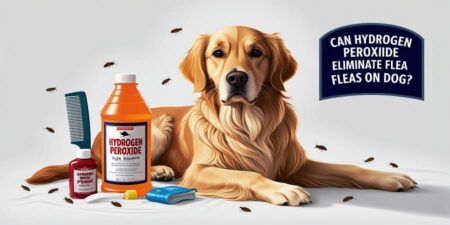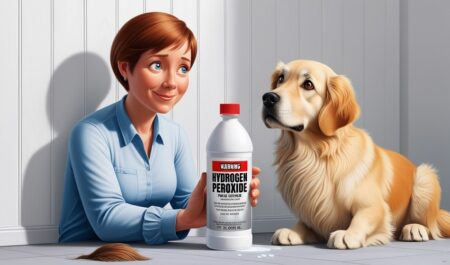A typical household substance with antibacterial and disinfecting qualities is hydrogen peroxide. Can hydrogen peroxide be used to kill fleas on dogs? This is a question that many pet owners have. Hydrogen peroxide has little efficacy in killing fleas in dogs, however it can be useful in some cases for cleaning surfaces or disinfecting wounds. Resistant parasites, fleas have a life cycle that extends beyond the adult fleas that are visible on a pet’s fur. Hydrogen peroxide is ineffective against flea eggs, larvae, or pupae, although it may kill adult fleas on contact. Hydrogen peroxide can also irritate and dry out a dog’s skin, which could exacerbate pre-existing skin conditions. Consequently, even though hydrogen peroxide might have some disinfecting qualities, using it as a primary
Is hydrogen peroxide safe for a dog’s skin?
It is OK to use hydrogen peroxide on a dog’s skin, but use caution when doing so. Even though it’s frequently used to treat small cuts and wounds, prolonged or frequent use might irritate the skin and create dryness. Furthermore, hydrogen peroxide should never be applied to serious burns or wounds without first diluting it with water. Before using hydrogen peroxide or any other topical treatment to your dog’s skin, it is imperative that you speak with a veterinarian to be sure it is acceptable and to get the right advice on dosage and application.
Do vets recommend hydrogen peroxide?
In some circumstances, such as when a dog inadvertently consumes a poison, veterinarians may advise using hydrogen peroxide. When given correctly and quickly after ingesting harmful substances, hydrogen peroxide can efficiently cause vomiting; nevertheless, this should only be done under a veterinarian’s supervision. Veterinarians may, however, recommend safer and more efficient alternatives or products for other uses, such as flea treatment or wound cleaning. It is imperative that you heed a veterinarian’s advise and never use hydrogen peroxide without first consulting them.
How to get rid of fleas in your home
It takes a thorough strategy to eradicate fleas from your home, focusing on the eggs, larvae, and pupae of adult fleas as well as their adults. Here’s how to get rid of fleas in your house efficiently:
Vacuuming: Give every carpet, rug, upholstery, and floor a good vacuum. Pay close attention to any places that are frequently visited by pets. After vacuuming, discard the vacuum bag right away to stop fleas from re-infesting the area.
Cleaning Bedding and Linens: To eradicate fleas and their eggs, wash all bedding, linens, and pet bedding in hot water and then dry them on the maximum heat setting.
Pet flea treatments: Apply flea control solutions that have been suggested by a veterinarian to every pet in the home. This can include flea collars, oral pills, and topical treatments.
Flea Foggers or Sprays: To get rid of fleas in your house, use flea foggers or sprays. Make sure you closely adhere to the directions and that no family members or pets are inside the house throughout the treatment.
Treating Your Yard for Fleas: Use flea control solutions to treat outside spaces like patios, gardens, and yards to stop fleas from getting into these areas and then coming back into your house.
Regular Prevention: To avoid more infestations, give your pets a regular flea prevention program. This can involve using flea collars, monthly treatments, or oral drugs..
Professional Pest Control: To get rid of fleas from your house, think about employing a professional pest control agency if the infestation is severe or continues.
You can successfully get rid of fleas in your home and make sure that you and your pets live in a flea-free environment by following these instructions and using a thorough approach.
Treat your dog to kill fleas and provide relief from itching
Using the proper flea treatment items that your physician has advised is crucial to treating fleas and relieving itching in your dog. These could be flea collars, oral drugs, or topical treatments. To relieve itching and discomfort, you should also think about giving your dog a bath using a mild, flea-repellent shampoo made for dogs. Frequent dog grooming can also aid in clearing your dog’s coat of fleas and flea filth. It’s critical to treat fleas as soon as possible in order to stop infestations and ease your dog’s discomfort. For more advice and treatment options, speak with your veterinarian if the itching continues or gets worse.
Can hydrogen peroxide hurt a dog?
It is true that if hydrogen peroxide is applied incorrectly or in large quantities, it may harm a dog. Even though hydrogen peroxide is frequently used to make dogs throw up after ingesting specific chemicals, it should only be used under a veterinarian’s supervision. Improper use or dosage of hydrogen peroxide can cause gastrointestinal tract irritation, vomiting, and diarrhea, among other unfavorable effects. Furthermore, as hydrogen peroxide can impede healing and worsen tissue damage, it should not be applied to burns, punctures, or deep wounds. Before administering hydrogen peroxide or any other home treatment to your dog, it is imperative to speak with a veterinarian to be sure it is both safe and suitable for your pet’s particular circumstances.
Takeaway
The most important lesson is to never treat your dog at home with hydrogen peroxide or any other cure without first visiting a veterinarian. While hydrogen peroxide can be helpful in some cases—for example, causing vomiting after ingesting toxins—it should only be used under veterinary supervision to guarantee safety and the right dosage. Hydrogen peroxide usage done incorrectly might have negative effects and could hurt your dog. Furthermore, never forget to put your dog’s health and wellbeing first by adhering to the correct professional instructions for flea control. treatment, wound care, and any other medical concerns. By working closely with your veterinarian, you can ensure the safety and comfort of your furry friend.








